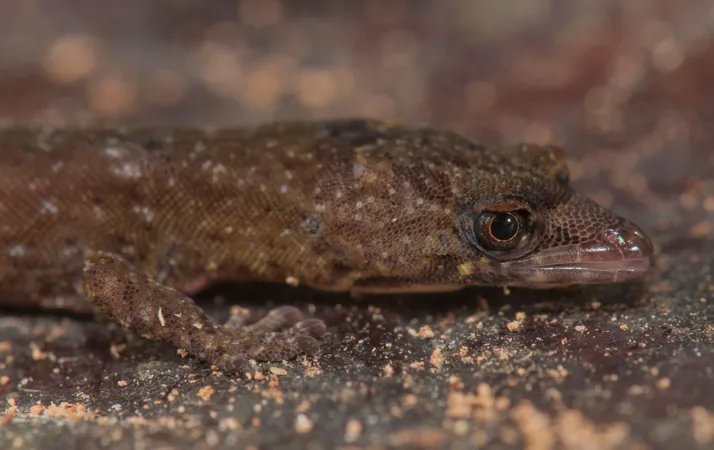
Groundbreaking Discovery: New Gecko Species Unearthed in Venezuela!
2024-11-11
Author: Daniel
Groundbreaking Discovery: New Gecko Species Unearthed in Venezuela!
In an astonishing revelation that has thrilled the scientific community, a team of biologists led by researchers from The University of Texas at Arlington has identified a brand new species of gecko in the stunning Paria Peninsula of northeastern Venezuela. Officially recognized and set for publication in the reputable *Zoological Journal of the Linnean Society*, this discovery shines a spotlight on the extraordinary traits and biodiversity found in this unique region.
New Species Description
The newly discovered species, scientifically named *Pseudogonatodes fuscofortunatus*, measures a mere 2.5 inches long, showcasing a striking brown hue, a cone-shaped head, and a notably elongated snout. Its unique skull anatomy, featuring fully separated nasal bones and fused parietal bones, sets it apart from its relatives, revealing uncommon skeletal traits that fascinated researchers.
Research Methodology
Through an intricate blend of visual assessments, advanced molecular genetics, and high-resolution X-ray computed tomography (CT) scans, the research team was able to confirm the distinctiveness of this gecko. The gecko's unique characteristics were first noted during fieldwork conducted in 2002 and again in 2014, culminating in a thorough investigation due to its peculiar cranial structure.
Significance of the Name
Interestingly, the species name *fuscofortunatus* not only describes the gecko's beautiful brown coloration but also nods to the fortuitous discovery of this enigmatic creature.
Expert Insights
"The Paria Peninsula, nested within the Coastal Mountain Range of Venezuela, has emerged as a hotspot for diverse reptile and amphibian discoveries in recent decades," shared Walter E. Schargel, the lead author and a professor specializing in biology and Earth sciences at UT Arlington. "The interplay of the region’s layered geography and climate produces a tapestry of habitats, making it a cradle for varied species."
Collaborative Research Efforts
The research team, a collaboration of experts from institutions across the globe—including the United States, Portugal, Spain, Brazil, Colombia, and Venezuela—emphasizes the importance of multidisciplinary approaches in unveiling such hidden treasures of biodiversity. Their efforts combined field observations, genetic analyses, and the use of cutting-edge imaging technology to meticulously document this new addition to the gecko family.
Call for Conservation
"This remarkable finding not only expands our appreciation for the biodiversity in this segment of Venezuela but also underlines the critical importance of conserving these unique ecosystems," Dr. Schargel added fervently. "I sincerely hope that our discovery acts as a catalyst for enhanced conservation initiatives aimed at safeguarding the habitats of this rare gecko and its native counterparts."
Future Potential
Moreover, the study raises an intriguing potential: the Paria Peninsula is likely home to many other undocumented species, presenting a golden opportunity for future explorations. With modern technologies like CT scanning and molecular genetic analysis paving the way for these discoveries, scientists are optimistic about revealing even more hidden manifestations of life on Earth, thereby deepening our understanding of evolutionary biology and ecological resilience.
Conclusion
Expect more intriguing findings as researchers delve deeper into the lush landscapes of Venezuela—a biodiversity treasure trove just waiting to be unveiled!



 Brasil (PT)
Brasil (PT)
 Canada (EN)
Canada (EN)
 Chile (ES)
Chile (ES)
 España (ES)
España (ES)
 France (FR)
France (FR)
 Hong Kong (EN)
Hong Kong (EN)
 Italia (IT)
Italia (IT)
 日本 (JA)
日本 (JA)
 Magyarország (HU)
Magyarország (HU)
 Norge (NO)
Norge (NO)
 Polska (PL)
Polska (PL)
 Schweiz (DE)
Schweiz (DE)
 Singapore (EN)
Singapore (EN)
 Sverige (SV)
Sverige (SV)
 Suomi (FI)
Suomi (FI)
 Türkiye (TR)
Türkiye (TR)